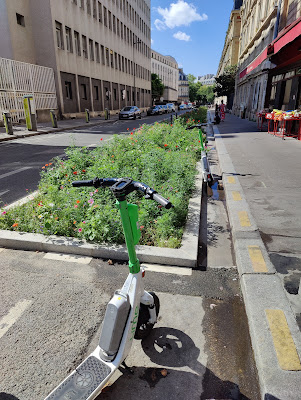 |
| Le Marché, Place du Marché Sainte-Catherine |
Ah, ben…she said, noncommittally, with what my father calls “the gallic shrug”.
Well, I said, illustratively, when I went into the cafe downstairs, I said “Bonjour”; the barman replied “Putain!” She laughed. Whatever he had been doing had not been going well. He had seen me but a few minutes later said “Bonjour”, not in the sense of recognition and acknowledgement but in terms of, Yes, what do you want?
The comedy of the exchange perhaps appealed to her bobo side. Bobo has long been a derogatory term she said but she said she was out and proud about it. It’s wanting your kids to be well-educated, in having nice things, but not taking things too seriously, being a little cool a bit funky, in the good sense, wanting to have fun. Her apartment was cosy, full of bright, Picasso inspired motifs and colours, posters of jazz musicians and jazz playing lazily in the background.

Picasso's magnificent sense of humour
 |
| Picasso museum garden |
My host recommended Le Marché, a restaurant in Place du Marché Sainte-Catherine with an agreeable man running it and good food for a reasonable price.
 |
If eating out in France, I like to go around midday. You are more likely to get a table, the food is fresh and things have not become stressful. Afterwards, I came across the husband and wife team running Moustache, an award-winning artisan glacier opposite the Square du Temple on the Rue de Bretagne. The 65% dark chocolate had just the depths you want in such a flavour and was not too sugary.
I’ll have to come back, for other flavours, I said. But what is there to do in the area? The husband part of the team suggested the Musée des Arts et Métiers. Before pudding though, I will need lunch, I said. So he recommended Chez Nenesse, a simple restaurant, again with pleasant hosts, regulars at lunchtime and perfectly cooked fish. The menu changes in the evening and becomes more upmarket. The ice cream makers told you me you would have to book for the evening.
When I went back to them I tried the coconut ice cream which had an infusion of nettle, and was mixed through with chia and a pink kind of barberry, which only foragers normally know about.
The outstanding ice cream that reminded me of the award winning independent ice-cream maker we used to have on George Street in Perth who had flavours like sea buckthorn. Now, another Perth resident, a young man has recently begun making outstanding ice cream to sell in Edinburgh, Joelato’s on NW Circus Place in Stockbridge. Apparently he trained at ice cream school in Italy.





.jpg)


